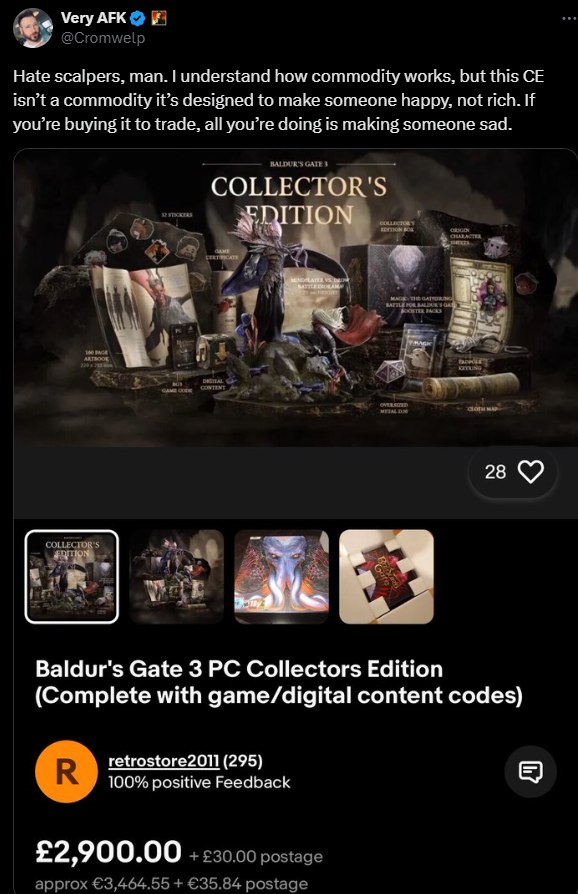Baldur's Gate 3 publishing director heaves a big sigh as scalpers predictably ruin it for everyone: 'All you’re doing is making someone sad'
Collector's conniption.

Baldur's Gate 3 has a snazzy collector's edition—good luck getting your mitts on it, though. As spotted by PC Gamer's own Robert Jones last year, resale prices (typically set by 'scalpers') have exceeded $2,000, which is more than a decent rig with which to play the damn thing might cost.
Sadly, this isn't a rare occurrence. Scalpers (people who make a side-gig out of hoarding limited stock to sell at a later date) are a pox upon just about every hobby where you can buy stuff. Last September, a wholesome event at the Van Gogh Museum got gatecrashed by impatient scalpers because the museum had the sheer temerity, the sheer gall, to offer children a special Pikachu card for turning in a quiz.
This doesn't just bum out consumers, though, it's also bumming out Larian Studio's director of publishing Michael Douse, who took to Twitter recently to highlight and express his frustration at the issue (thanks, Eurogamer).
"Hate scalpers, man. I understand how commodity works, but this [Collector's Edition] isn’t a commodity, it's designed to make someone happy, not rich," Douse writes, adding: "If you’re buying it to trade, all you’re doing is making someone sad."
Alas, as with the Van Gogh fiasco, I'm not convinced scalpers are making quiet and resourceful ethical considerations while pulling on the proverbial slot machine to hit it big. They even took to eBay to sell copies of Concord (you know, a game that doesn't exist anymore) simply because, well, it's a rare thing. And human beings have an unconquerable thirst for rare things.
The actual worth of something—its use as a commodity—doesn't matter a bit. Sure, Scalpers go for things that are arguably worth something, such as tickets for concerts and PC hardware, as they did during the chip shortage. But the 'demand' half of supply and demand is often a complete fabrication. Lobsters used to be prison food, synthetic diamonds are basically identical to diamonds from a mine, so it goes.
Cynically-speaking it represents something of a catch 22 for Douse (and Larian) who have, in general, been resistant to the idea of playing the capitalism game too hard. Collector's editions occupy a weird space—they're meant to make people happy, sure, but the idea of scarcity is a package deal in both the name and exercise. They're expensive and time-consuming to make by design, their stocks will be inherently low, and in a system where resales are allowed this kind of thing is inevitable, if a bitter pill.
Keep up to date with the most important stories and the best deals, as picked by the PC Gamer team.

Harvey's history with games started when he first begged his parents for a World of Warcraft subscription aged 12, though he's since been cursed with Final Fantasy 14-brain and a huge crush on G'raha Tia. He made his start as a freelancer, writing for websites like Techradar, The Escapist, Dicebreaker, The Gamer, Into the Spine—and of course, PC Gamer. He'll sink his teeth into anything that looks interesting, though he has a soft spot for RPGs, soulslikes, roguelikes, deckbuilders, MMOs, and weird indie titles. He also plays a shelf load of TTRPGs in his offline time. Don't ask him what his favourite system is, he has too many.


